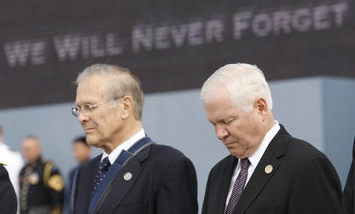It was whiplash Sunday as Defense Secretary Robert Gates was followed on ABC’s This Week broadcast by former defense secretary Donald Rumsfeld. The contrast between the mild-mannered Gates, with his soft Kansas twang, and Rumsfeld’s Chicago staccato couldn’t be clearer. Rumsfeld, once again, seemed to prefer certitude (a measure of a person’s positive feeling about something), while Gates opted for certainty (a measure of the degree to which a process or development may be realized).
The Libyan rebels are on the move toward Tripoli, NATO is taking charge of the mission, and President Obama will hail that change-of-command in a national address Monday night. Even the cautious Gates seems confident that things are getting better in Libya, especially for the U.S. “We in the Department of Defense are already beginning to do our planning in terms of beginning to draw down resources,” he said, “first from support of the no-fly zone, and then from the humanitarian mission.” Barely a week into the mission over Libya and Gates is already talking about pulling out. As mentioned, the contrast with Rumsfeld was instructive.
It was interesting to see one Pentagon pooh-bah after the other (Rumsfeld was on peddling his autobiography). Gates seems comfortable with ambiguity – a career spy, he had to learn to leaven certainty with it — while Rumsfeld made clear he doesn’t care for the fog of war. “If you go into something with a confusion and ambiguity about what the mission is — and we’ve heard four or five different explanations about why we’re there — and that is the root of the problem is the confusion that comes from that; confusion about what the mission is; confusion about who the rebels are; confusion about whether or not Gaddafi should be left in power; confusion about what the command and control should be,” Rumsfeld explained, using “confusion” a half-dozen times, with an “ambiguity” on top.
Part of Gates’ embrace of uncertainty, of course, it that he currently is running the Pentagon. Yet that didn’t keep Rumsfeld from being sure of uncertainty – “We know where they are,” he said on the same show on Mar. 30, 2003 (eight years ago this week). He was referring, of course, to Iraq’s weapons of mass destruction, which was the crowbar he and the Bush Administration had used to leverage the U.S. into war with Saddam Hussein 10 days earlier.
A couple more contrasting comments…
Rumsfeld on Gaddafi’s continued hold on power, and whether the war now underway should have his removal as a goal:
The most important question is whether or not Gaddafi will stay. If you put yourself in the shoes of the rebels, they wonder whether or not the coalition has an interest in Gaddafi leaving. And there’s a great deal of ambiguity about that. Gaddafi’s forces wonder whether or not Gaddafi will be leaving. And there’s that same time ambiguity affects their decision-making. And until that’s clarified, it seems to me, we’ll have a much more difficult time. I think that the goal has to be that Gaddafi leaves.
Gates on the same topic:
First of all, I think you don’t want ever to set a set of goals or a military mission where you can’t be confident of accomplishing your objectives. And as we have seen in the past, regime change is a very complicated business. It sometimes takes a long time.
Gates, when asked if the Libyan operation will be over by year’s end:
I don’t think anybody knows the answer to that.
Rumsfeld, when asked four months before the Iraq operation how long it would last:
I can’t tell you if the use of force in Iraq today would last five days or five weeks or five months, but it certainly isn’t going to last any longer than that.
More than eight years after the U.S. invaded Iraq, there are close to 50,000 U.S. troops still there, and 4,441 who will never come home. You can look it up, if you want to be certain.



